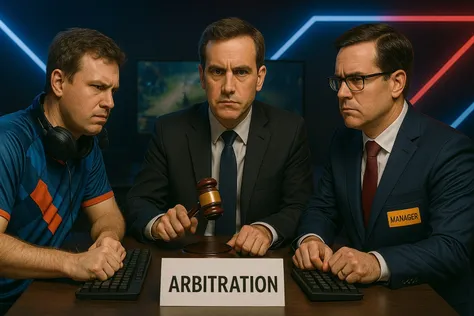In a world where video games have transformed from a mere leisure time activity into a cultural and economic phenomenon, the legal issues arising from it are as complex as they are fascinating. These include the concept of loot boxes – digital game packages with randomly selected prizes. Are these purely innocent game elements or a hidden form of gambling?
In video games, a loot box is in general a digital “box” containing unknown in-game content that can be purchased with in-game or real currency. It can contain anything from an extremely rare weapon, skin or character to something practically (for a given player) useless or completely ordinary (“trash”). The essence of loot boxes is that the player never knows what they will obtain for their purchase – this is determined by chance, or more precisely the degree of probability[1].
Loot boxes are not just a marginal element in the gaming industry, but a staple of even the world’s most played games. For example, industry giant Electronic Arts (EA) operates a loot box mechanism within its flagship FIFA and Madden games, featuring individual player cards that a player can add to their own team to add an element of surprise and unpredictability to the gaming experience. Similar elements are also present in Star Wars Battlefront II, a popular title from the iconic Star Wars franchise, or in major esports games like Counter Strike: Global Offensive or DOTA 2.
In addition, the popularity of loot boxes has grown considerably with the advent of free-to-play games. These are free to download and play, but entice players to spend money, which generates revenue for the game operator. Particularly problematic in this respect are games with loot boxes on mobile phones, which are easily accessible even to minors who can spend significant sums of money on loot boxes relatively quickly.
The above raises among others the question as to whether loot boxes constitute gambling. So where does this leave us from a legal perspective?
Nature of loot boxes and access abroad
Authorities and courts in some countries have recently begun to consider loot boxes a form of gambling, the operation of which is generally subject to strict regulation.
For example, in April 2018, the Dutch Gaming Authority issued a legal opinion that games that sell loot boxes while allowing the “transfer” of items earned are illegal because the content of the loot boxes is determined by chance and the potential winnings are tradeable outside of the game, i.e. have a market value[2]. In its report, the Authority said that four of the ten games it examined violated Dutch law in this way and demanded them to remedy the situation[3]. It also stated that while the loot box systems in the remaining six games were not illegal, they “encourage the development of addiction and are contrary to the objectives of the Authority”.
A similar position was adopted by the Belgian Gaming Commission. The Commission even called for the prosecution of EA, Valve and Activision Blizzard[4]. However, it should be noted here that the opinion of the Belgian Commission did not lead to the adoption of appropriate legislative changes and instead failed to have any effect[5].
The most recent and probably most interesting news from the world of loot boxes is this year’s case from Austria where a court ruled that packs of cards in FIFA constituted illegal gambling[6]. Similarly to what the Dutch Gaming Authority had stated, the reason given by the court was the possibility of players to sell the cards on the black market, which means that random items from the loot boxes have a certain financial value and profit can be made from them. According to this judgment, Sony (which accepted payment for EA through the PlayStation interface) must refund the money paid to the players and EA must designate FIFA games as gambling[7] that requires a licence to operate[8].
Loot boxes under Czech law
The current Czech Gambling Act does not reflect the issue of loot boxes[9]. However, the topic was briefly addressed by the Ministry of Finance in its Regulatory Impact Assessment of the Gambling Act and Related Legislation in which it acknowledged the risky nature of loot boxes and recognised that the concept may meet the definition of gambling if purchased with real money. But how exactly, in the context of effective Czech law, can loot boxes be assessed without explicit legal regulation?
In general, the definition of gambling includes three basic elements: a stake, a prize (a non-guaranteed return on the stake) and an element of chance in determining the possibility of winning or losing. The Ministry of Finance refers to the financial nature of the stake as a key factor in the case of loot boxes. We believe that context is also important and, therefore, the fundamental question is whether loot boxes can constitute a separate game of chance.
The crucial difference between gambling within the meaning of the Gambling Act and loot boxes is that while gambling is generally operated in isolation and is the centrepiece of the gaming experience, loot boxes are more of a separate element serving primarily as an adjunct to the video game.
We believe that in most cases, loot boxes will not constitute a separate game of chance, as their content, apart from being purchased with real money, will usually be usable solely in a video game environment.
However, it will always depend on the specific video game and on how it is played. For example, if it turns out that loot boxes in a video game are “opened” largely for the purpose of trading their content afterwards, rather than for the purpose of success in a skill game, the risk of their classification as gambling would increase[10].
Conclusion
The current regulation of loot boxes is inherently legally problematic, and it is impossible to say with certainty which loot boxes may constitute gambling under the Gambling Act and which may not.
The urgency of the matter is also supported by the fact that the current scope of the Gambling Act does not allow the operation of games other than those expressly listed therein. Classification of loot boxes as games of chance would make it virtually impossible to operate them in the Czech Republic, which would have major implications for the Czech gaming market.
However, in connection with the recent initiative of the European Parliament which called on the European Commission to consider extending EU legal regulation to loot boxes earlier this year, it can be assumed that the Czech legislator will also address this issue in the future.
For the moment, the only recommendation for game developers is setting up loot boxes in their games to generate content for players to use exclusively in the game that is not tradeable in the “outside” world for real money.
If you are looking to implement this system in your game, do not hesitate to contact us. We have extensive experience in gambling regulation and will be pleased to help you protect your business interests.
- [1] – For example: Since 2017, Apple has stated in its App Store Terms that apps offering “loot boxes” or other similar mechanisms must disclose the odds of receiving each type of item to customers prior to purchase. China introduced similar regulation in the same year. For more information, click here: https://www.gamesindustry.biz/apple-updates-guideline-to-require-disclosure-of-loot-box-odds and https://www.theverge.com/2017/5/2/15517962/china-new-law-dota-league-of-legends-odds-loot-box-random.
- [2] – Full opinion available here: https://kansspelautoriteit.nl/over-ons/publicaties/onderzoek/.
- [3] – EA was also requested in relation to FIFA, but did not make the change, following which the Authority imposed a fine, which EA challenged in court. At first instance, the judge agreed with the Authority's opinion and upheld the fine. However, EA's appeal was successful and the first-instance judgment was overturned on the grounds that the cards in FIFA were acquired for participation in the game and were not a stand-alone game, and that “the tradeability of the packs on the black market is relative. The black market mainly focuses on trading complete accounts...”
- [4] – For the full opinion, click here: https://www.gamingcommission.be/sites/default/files/2021-08/onderzoeksrapport-loot-boxen-Engels-publicatie.pdf.
- [5] – For more information, click here: https://www.gamesindustry.biz/study-finds-that-belgiums-loot-box-ban-isnt-being-enforced.
- [6] – For more information, click here: https://www.gamesindustry.biz/austrian-court-rules-that-fifa-loot-boxes-violate-gambling-laws.
- [7] – Alternatively, modify the game mechanism so that it cannot be classified as gambling.
- [8] – This conclusion was upheld by the Court of Appeal in Vienna, while Sony and EA waived further remedies. However, the practical impact of the judgments remains unclear. For more information, click here: https://www.kicker.de/desaster-fuer-ea-und-sony-lootboxen-in-zweiter-instanz-fuer-illegal-erklaert-966370/artikel.
- [9] – This is not the case in the first draft of its amendment, which was discussed by the government this year. For more information, click here: https://odok.cz/portal/veklep/material/KORNCQ8GUZZU/.
- [10] – Even in such cases, however, ethical and psychological considerations must be taken into account. For instance, studies in the UK have shown that there is a direct link between the purchase of loot boxes and problem gambling. For more information, click here: https://www.bbc.com/news/technology-56614281.









